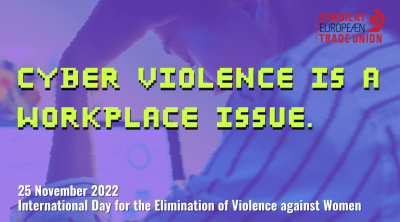Bosses should be prevented from discriminating against victims of revenge porn and other forms of online sexual harassment at work as part of the EU directive on combating violence against women.
The European Trade Union Confederation is making the call on the international day for the elimination of violence against women amid growing evidence employers are discriminating against victims of image-based sexual harassment.
Employers now routinely carry out online searches for prospective employees, which research has found has resulted in discrimination against victims of cyber violence in the labour market. A woman in France said she could no longer find work after a former partner posted videos of her on Facebook.
There are also numerous cases of women losing their careers after being victims of revenge porn. For example, a woman in Italy was fired by her employer after reporting to the police that a number of videos of her had been published against her permission and gone viral.
Overlooked
More than half of victims fear their professional reputation will be damaged in the long term, while 13% believe they had difficulty in getting a job and 6% say they were fired from a job, according to a survey by the Cyber Civil Rights Initiative.
Despite the abundant evidence of the problem, the issue has been overlooked in the draft EU directive on combating violence against women. The directive recognises that domestic violence can have economic consequences but does not currently do so for cyber violence.
The ETUC is calling on Members of the European Parliament to rectify the omission by including a provision which will prevent employers from discriminating against victims when it comes to recruitment, disciplinary or promotion processes.
ETUC Acting General Secretary Esther Lynch said:
“As online screening and networking become more important in the labour market, a growing number of women are having their careers wrecked due to cyber violence like revenge porn.
“In some cases through blatant discrimination like being fired as a result of their abusers sending images to their workplaces or circulating them online, but also through more insidious forms of discrimination like being sidelined and overlooked for promotion.
“The impact of image-based abuse on women’s economic security is violent and long lasting - it could not be clearer that it is a workplace issue yet that is not recognised in the draft directive.
“On the day for the elimination of violence against women, trade unions call on MEPs and ministers to ensure employers can no longer make victims pay the price of cyber violence.”

